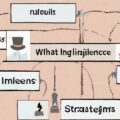Emotional Intelligence (EI) has become a pivotal factor in personal and professional success. Understanding and measuring EI can help individuals enhance their interpersonal skills, improve relationships, and achieve better mental health. This article explores the top emotional intelligence scales and assessments available today.
What is Emotional Intelligence?
Emotional Intelligence, often abbreviated as EI or EQ (Emotional Quotient), refers to the ability to recognize, understand, manage, and utilize emotions effectively. It involves skills such as emotional awareness, empathy, self-regulation, and social skills. High levels of EI are linked to better leadership, improved job performance, and stronger personal relationships.
Why Measure Emotional Intelligence?
Measuring EI can provide valuable insights into an individual’s emotional strengths and areas for improvement. It can help organizations in hiring, training, and developing employees, leading to a more harmonious and productive workplace. On a personal level, understanding your EI can lead to better emotional regulation, enhanced empathy, and improved communication skills.
Top Emotional Intelligence Scales & Assessments
Mayer-Salovey-Caruso Emotional Intelligence Test (MSCEIT)
The MSCEIT is one of the most well-known and widely used EI assessments. Developed by researchers John D. Mayer, Peter Salovey, and David R. Caruso, this test measures four key areas of emotional intelligence: perceiving emotions, using emotions to facilitate thought, understanding emotions, and managing emotions. The MSCEIT is designed to be an objective measure of EI, providing a comprehensive analysis of an individual’s emotional abilities.
Emotional Quotient Inventory (EQ-i 2.0)
The EQ-i 2.0, developed by Dr. Reuven Bar-On, is another popular EI assessment tool. This self-report questionnaire evaluates various aspects of emotional and social functioning, including self-perception, stress management, interpersonal skills, and decision-making. The EQ-i 2.0 is widely used in organizational settings for leadership development, team building, and employee training.
Trait Emotional Intelligence Questionnaire (TEIQue)
The TEIQue, created by Dr. K. V. Petrides, measures trait emotional intelligence, which refers to a person’s self-perceived emotional abilities. This assessment evaluates factors such as emotionality, self-control, well-being, and sociability. The TEIQue is often used in academic research and personal development contexts to understand how individuals perceive and manage their emotions.
Schutte Self-Report Emotional Intelligence Test (SSEIT)
The SSEIT, also known as the Schutte EI scale, is a self-report measure that assesses emotional intelligence based on Daniel Goleman’s model of EI. The test includes 33 items that evaluate emotional awareness, regulation, and utilization. The SSEIT is commonly used in educational and psychological research to explore the relationship between EI and various life outcomes.
How to Choose the Right EI Assessment
Choosing the right EI assessment depends on your goals and the context in which you plan to use it. For organizational purposes, tools like the MSCEIT and EQ-i 2.0 are ideal due to their comprehensive nature and focus on workplace applications. For personal development, assessments like the TEIQue and SSEIT may be more suitable as they provide insights into self-perceived emotional abilities.
Benefits of Understanding Your Emotional Intelligence
- Improved Self-Awareness: Knowing your EI can help you understand your emotions better, leading to greater self-awareness.
- Better Relationships: High EI contributes to better empathy and communication skills, which are crucial for healthy relationships.
- Enhanced Mental Health: Managing emotions effectively can reduce stress and improve overall mental well-being.
- Increased Job Performance: EI is linked to better leadership and teamwork, enhancing job performance and career success.
FAQ
What is the best emotional intelligence assessment for workplace settings?
The MSCEIT and EQ-i 2.0 are considered the best for workplace settings due to their comprehensive analysis and focus on organizational applications.
Can emotional intelligence be improved?
Yes, emotional intelligence can be developed and improved through training, practice, and self-awareness exercises.
How long does it take to complete an EI assessment?
The time required varies by assessment. The MSCEIT typically takes about 30-45 minutes, while the EQ-i 2.0 can take up to an hour.
Are EI assessments reliable?
Many EI assessments, such as the MSCEIT and EQ-i 2.0, are backed by extensive research and have demonstrated reliability and validity.
Is emotional intelligence more important than IQ?
Both EI and IQ are important, but EI often plays a crucial role in personal and professional success, particularly in areas involving interpersonal relationships and emotional regulation.









